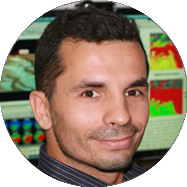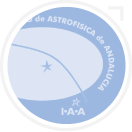CNRS - Centre National de la Recherche Scientifique
 |
Francois Forget Senior scientist of Centre National de la Recherche Scientifique (CNRS) Work Packages: WP1 and WP7 |
|
| Mini CV
Dr. François Forget is a senior scientist of Centre National de la Recherche Scientifique (CNRS) at LMD with more than 20 years of experience in Mars climate studies combining observation analysis and climate modeling. He has been leading the development of the LMD Mars General Circulation model which can be used to simulate the Martian 3D atmospheric circulation, photochemistry, the dust, CO2 and water cycles. The model is extended into the thermosphere and has been adapted to create a mesoscale/microscale model of the Martian atmosphere. It is also employed to produce the Mars Climate Database125 used by more than 150 teams around the world to prepare and exploit most Mars space missions. F. Forget is also the Interdisciplinary Scientist on the ESA Mars Express mission in charge of the atmospheric and climate observations is a co-I on ACS on the ExoMars Trace Gas Orbiter and co-PI on the Amelia experiments related to the analysis of the descent observations obtained by the ExoMars 2016 Lander. He is the recipient of several awards, including the 2014 David Bates Medal from the European Geophysical Union for exceptional contributions to planetary and solar system sciences.
He manages WP1 dedicated to Mars water and cloud cycles. He also is involved in WP1 (data assimilation) and coordinate T8.2, and contribute to WP7. |
||
 |
Franck Montmessin Senior scientist of Senior scientist of Centre National de la Recherche Scientifique (CNRS) in LATMOS Work Packages: WP1 and WP4 |
|
| Mini CV
Dr. Franck Montmessin is a senior scientist of Centre National de la Recherche Scientifique (CNRS) in LATMOS, FM has more than 15 years of experience in the Mars, Venus and Earth atmosphere exploration, through his efforts as a leader in space instrumentation, the modelling study of the Martian atmosphere, as well as the analysis of remote sensing data (UV, IR).FM is the PI, since 2009, of the dual ultraviolet-near-infrared spectrometer SPICAM onboard the ESA Mars Express mission. FM is also the lead scientist of the Micro-ARES ESA facility instrument for the ESA/ExoMars 2016 mission. He is Co-I of OMEGA on Mars Express, SPICAV on Venus Express, and of the IUVS instrument on the NASA/MAVEN mission. FM also serves as the Deputy-PI of the Atmospheric Chemistry Suite on the orbital platform of the ExoMars mission.
He manages WP1 related to the new retrieval tools applied to existing Mars observation datasets. He also contributes to WP4 dedicated to the water cycle. |
||
| Franck Lefèvre Senior scientist of Senior scientist of Centre National de la Recherche Scientifique (CNRS) in LATMOS Work Packages: |
||
| Mini CV
Dr. Franck Lefèvre is a senior scientist of CNRS in LATMOS with more than 20 years of experience in photochemical modeling of the atmosphere of the Earth, Mars, and Venus. He is a recognized specialist of Mars atmospheric chemistry and has written several papers on the chemistry and climatology of ozone on Mars. F. Lefèvre is co-PI of SPICAM on board Mars Express, co-I of SPICAV on board Venus Express, and Collaborator of IUVS on MAVEN. F. Lefèvre has built and is in charge of the development of the photochemical module implemented in the LMD general circulation model.
He uses this model in WP6 to analyze space-borne observations of Mars photochemistry. |
||
 |
Anni Määttänen Researcher at the Researcher at the Centre National de la Recherche Scientifique (CNRS) Work Packages: WP6 |
|
| Mini CV
Dr. Anni Määttänen has 10 years of experience in studying the Martian atmosphere and since 2009 has worked as a junior research scientist at the CNRS. She has experience in several aspects of the Martian atmosphere, ranging from boundary layer to mesospheric clouds. Her main expertise is aerosols and clouds on Mars and on Venus, both from observational and theoretical/modelling aspects. She is co-I of SPICAM and has ongoing collaborations with several other instrument teams.
She participates in WP6 using her experience of solar occultation retrievals on Mars. |
||
| Dr. Jean-Yves Chaufray Researcher at the Senior scientist of Centre National de la Recherche Scientifique (CNRS) Work Packages: |
||
| Mini CV
Dr. Jean-Yves Chaufray is a planetary scientist, specialized in the study of planetary upper atmospheres and the theory of radiative transfer of resonant lines. His interests include the upper atmosphere/exosphere and escape processes on Mars, Venus and Mercury. He has published several papers in refereed journals regarding the exosphere of Mars. Mission activities include Co-I on Mars Express SPICAM, Venus Express SPICAV, and Bepi-Colombo PHEBUS. He is unfunded collaborator of IUVS/MAVEN. He is also working on the modeling of the Martian ionosphere and thermosphere.
In this project, he compares the simulated H Lyman-a emission from GCMExosphere- Radiative transfer coupling with the Mars Express observations to study the variability of the hydrogen escape rates. |
||
 |
Ehouarn Millour Researcher at the Researcher at the Centre National de la Recherche Scientifique (CNRS) Work Packages: WP8, WP7 & WP4 |
|
| Mini CV
Dr. Ehouarn Millour is a CNRS Research Engineer at LMD, E. Millour has a 15 years of experience in Computational fluid dynamics and 10 years of experience in Numerical Mars Climate Modelling. He has served as project manager on the LMD Mars Climate Model and Mars Climate Database projects.
He is directly involved in WP8 (data assimilation) and also contribute to WP7, WP4 and in particular water cycle modelling (T4.3). |
||
| Alizée Pottier PhD Student at Centre Nacional de la Recherche Scientifique (CNRS) Work Packages: WP1 and WP7 |
||
| Mini CV
Alizée Pottier is a PhD student currently working in the LATMOS laboratory. Her research is focused on the Martian water cycle using data from orbiters and also a numeric model developed in the laboratoire de météorologie dynamique.
Using that model, the goal is to reproduce the atmosphere of Mars to better understand the main water reservoirs; to study the winds and the clouds. |
||
































